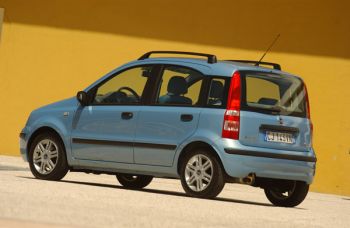|
Fiat suffered a
poor final month of the year in their key home market,
claiming 26.6 percent of all new car registrations. However
it was an unexpectedly strong month for sales, and Fiat saw
their output rise year-on-year.
Fiat are highly
reliant on Italian new car buyers who account for 40 percent
of the auto division's worldwide sales. This slip last month
sees them end the year with a market share of 28 percent.
Although this figure is broadly the same with their 2003
performance, and Fiat can take much comfort from having
stemmed a declining market share in recent years. It is
however, below their forecast of around 30 percent, but in a
year that saw a new Group CEO take over the reigns, and who
immediately instigated widespread restructuring and
personnel changes aimed at putting the century-old carmaker
firmly back on its feet, it is a solid base from which an
exciting recovery can constructively be built on.
Fiat did however
outperform the Italian new car market, which rose and fell
during the course of the last year. Fiat's sales over the
whole 2004 was up by one percentage point, against an
overall market performance that shifted higher by 0.5
percent. This performance can be put in better perspective
by the fact last year government new car incentives heavily
distorted the true picture, and so this year Fiat stood on
its own merits. Also very satisfying to Fiat management was
the fact that the higher-margin retail sales sector climbed
sharply from 63 to 70 percent, as the carmaker looked to
steer clear of the unprofitable discounting strategy
employed by most of their rivals.
While Fiat very
much struggled last month with their market share, Italian
car sales in general were up during December, with 149,900
cars registered, up a pleasing 5.22 percent on December 2003
when 142,469 were registered. These strong new car
registrations last month combined to give Italy a year total
of 2.26 million new cars sold.
Although Fiat underperformed the market, they were also up
year-on-year, by 2.4 percent. This was attributed partially
to an extra two working days last month over the previous
year (22 as opposed to 20 in December 2003) and a 30th
November strike that cause a bottleneck of registrations
that funneled backwards into December.
The result was
actually the second best performance of all time, although
it lagged along way behind December 2002, when a whole raft
of government incentives saw new car sales rocket to
198,061, more than double the figures achieved in 2001. |
|
 |
|
Undoubted star
sales performer over the year for Fiat was the 'Car
of the Year' award winning Panda supermini |
|
|
Overall, the Italian new car market, which closed the year
fractionally up on 2003, at 0.53 percent, had started 2004
brightly, with the first quarter registering and increase of
2.9 percent. This gain was given up during the second
quarter, which shrunk by 2.5 percent, helped downwards by
higher oil prices and a sluggish economic outlook, while the
subsequent two quarters remained reasonably flat.
The stock
markets reacted favourably to the results, with Fiat shares
rising on the Milan bourse during the morning trading
session. Deputy Industry Minister Adolfo Urso commented this
afternoon that, "The car market figures for 2004 are
encouraging, because they were obtained in a difficult
situation, marked by the oil price rise, and with no state
incentives. A result which rewards companies such as Fiat,
which invested on new models, brands and marketing, that is,
an efficient industrial policy." Urso concluded that, "We
must pursue this policy, because 2005 will be a crucial
year."
Star performers
of the year for Fiat were the 'Car of the Year' award
winning Panda and the new Lancia Ypsilon, while attention
now turns to the next generation Fiat Punto, due to arrive
this coming autumn, and what will be without doubt, the key
new model introduction of 2005 for Fiat.
|
|
|
|
![]()
![]()